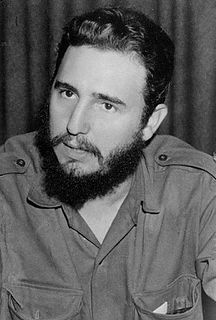 W
WFidel Alejandro Castro Ruz was a Cuban revolutionary, lawyer, and politician who was the leader of Cuba from 1959 to 2008, serving as the prime minister of Cuba from 1959 to 1976 and president from 1976 to 2008. Ideologically a Marxist–Leninist and Cuban nationalist, he also served as the first secretary of the Communist Party of Cuba from 1961 until 2011. Under his administration, Cuba became a one-party communist state; industry and business were nationalized, and state socialist reforms were implemented throughout society.
 W
WThe 26th of July Movement was a Cuban vanguard revolutionary organization and later a political party led by Fidel Castro. The movement's name commemorates its 26 July 1953 attack on the army barracks on Santiago de Cuba in an attempt to start the overthrowing of the dictator Fulgencio Batista.
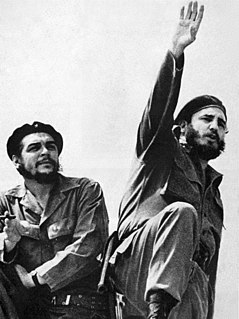 W
WThe aftermath of the Cuban Revolution is a period in Cuban history typically defined as starting in 1959 and ending in 1970. The period encompasses early domestic reforms, growing international tensions, and ending with the failure of the 1970 sugar harvest.
 W
WThe United States' Central Intelligence Agency made numerous unsuccessful attempts to assassinate Fidel Castro during his time as the president of Cuba.
 W
WThe Battle of Guisa was a relevant event in the history of Cuba. One of the major victories of the Rebel Army in the Liberation War (1956-1958) sustained against the dictatorship of Fulgencio Batista in Cuba.
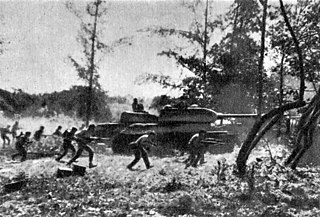 W
WThe Bay of Pigs Invasion was a failed landing operation on the southwestern coast of Cuba in 1961 by Cuban exiles who opposed Fidel Castro's Cuban Revolution. Covertly financed and directed by the U.S. government, the operation took place at the height of the Cold War, and its failure led to major shifts in international relations between Cuba, the United States, and the Soviet Union.
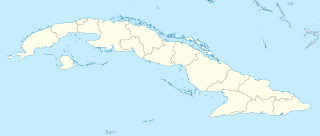 W
WBirán is a village in Holguín Province of Cuba, hamlet and consejo popular of Cueto, best known as the birthplace of Ramón, Fidel, and Raúl Castro. Their father owned a 23,000 acre (93 km²) plantation there.
 W
WCoppelia is an ice cream parlor chain in Cuba, originally built in a project led by Fidel Castro. Coppelia is state-run and sells in Cuban pesos (CUP). Havana's Coppelia employs more than 400 workers and serves 16,000 litres (4,200 US gal) of ice cream to 35,000 customers each day. It is named after the ballet Coppélia.
 W
WThe Cuban intervention in Angola began on 5 November 1975, when Cuba sent combat troops in support of the communist-aligned People's Movement for the Liberation of Angola (MPLA) against the pro-western National Union for the Total Independence of Angola (UNITA) and National Liberation Front of Angola (FNLA). The intervention came after the outbreak of the Angolan Civil War, which occurred after the former Portuguese colony was granted independence after the Angolan War of Independence. The civil war quickly became a proxy war between the Eastern Bloc led by the Soviet Union and the Western Bloc led by the United States. South Africa and the United States backed UNITA and the FNLA, while communist nations backed the MPLA.
 W
WThe Cuban Missile Crisis, also known as the October Crisis of 1962, the Caribbean Crisis, or the Missile Scare, was a 1-month, 4 day confrontation between the United States and the Soviet Union which escalated into an international crisis when American deployments of missiles in Italy and Turkey were matched by Soviet deployments of similar ballistic missiles in Cuba. Despite the short time frame, the Cuban Missile Crisis remains a defining moment in U.S. national security and nuclear war preparation. The confrontation is often considered the closest the Cold War came to escalating into a full-scale nuclear war.
 W
WThe Cuban Revolution was an armed revolt conducted by Fidel Castro and his fellow revolutionaries of the 26th of July Movement and its allies against the military dictatorship of Cuban President Fulgencio Batista. The revolution began in July 1953, and continued sporadically until the rebels finally ousted Batista on 31 December 1958, replacing his government. 26 July 1953 is celebrated in Cuba as the Day of the Revolution . The 26th of July Movement later reformed along Marxist–Leninist lines, becoming the Communist Party of Cuba in October 1965.
 W
W90-year old former First Secretary of the Communist Party of Cuba and President of the Council of State, Fidel Castro died of natural causes at 22:29 (CST) in the evening of 25 November 2016. His brother, the then-President of the State Council and then-First Secretary Raúl Castro, made an announcement about his death on state television. One of the most controversial political leaders of his era, Castro both inspired and dismayed people across the world during his lifetime. The London Observer stated that he proved to be "as divisive in death as he was in life", and that the only thing that his "enemies and admirers" agreed upon was that he was "a towering figure" in world affairs who "transformed a small Caribbean island into a major force in world affairs". The Daily Telegraph noted that across the world he was "either praised as a brave champion of the people, or derided as a power-mad dictator." Castro's body was cremated and his ashes were interred in Santiago de Cuba on 4 December 2016, and hundreds of thousands of Cubans commemorated the event.
 W
WFidel Castro Handbook is a 2006 book by British politician George Galloway. Galloway describes himself as "a partisan for Cuba, for the revolution, for the leadership'". The book details a history of Cuba since the revolution and the progress made despite sanctions from the United States. The book was launched at Portcullis House, Westminster, London.
Lisa Howard was an American journalist, writer, and television news anchor who previously had a career as an off-Broadway theater and soap opera actress. In the early 1960s, she became ABC News's first woman reporter, and was the first woman to have her own national network television news show. Howard developed a relationship with Cuba's Fidel Castro, whom she met to interview, and was a go-between for a time between Castro and the American White House. Her network career ended when she became openly involved in the 1964 United States Senate election in New York. In 1965, Howard suffered a miscarriage and depression, dying of an overdose of painkillers.
 W
WThis is a comprehensive list of awards and honours bestowed upon the Cuban revolutionary and statesman Fidel Alejandro Castro Ruz.
 W
WFidel Alejandro Castro Ruz was the leader of Cuba from 1959 to 2006. He led the Cuban Revolution which overthrew the government of Fulgencio Batista. This is a list of places, buildings and other things named for Castro.
 W
WIlona Marita Lorenz was a German woman who had an affair with Fidel Castro in 1959 and in January 1960 was involved in an assassination attempt by the CIA on Castro's life.
 W
WThe Machurucuto incident, also known as the Invasion of Machurucuto, was a battle involving Venezuelan Army and National Guard troops against Cuban trained guerrillas. On 10 May 1967, a dozen guerrillas landed in Venezuela at the beach of Machurucuto. The Army of Venezuela and the National Guard engaged them on the night of 10 May and the battle lasted into 11 May. Two men were captured while the remaining were killed in battle. The guerrillas had completed paramilitary training in Cuba so they could recruit guerrillas in the Venezuelan Andes region to overthrow President Raúl Leoni.
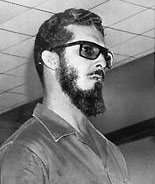 W
WAugusto Martínez Sánchez was a Cuban lawyer, military and politician; one of the commanders of the Cuban Revolution, close to Fidel Castro. Martínez Sánchez was a member of the July 26 Movement since April 1958 and participated in the guerrilla struggle in Sierra Maestra against the government of Fulgencio Batista, attached to the Second Eastern Front "Frank País", under the direct orders of Raúl Castro.
 W
WMayarí is a municipality and town in the Holguín Province of Cuba.
 W
WMilitary Units to Aid Production or UMAPs were agricultural concentration camps operated by the Cuban government from November 1965 to July 1968 in the province of Camagüey. The UMAP camps served as a form of forced labor for Cubans who could not serve in the military due to being conscientious objectors, Christians and other religious people, homosexuals, or political enemies of Fidel Castro or his communist revolution. The language used in the title can be misleading, as pointed out by historian Abel Sierra Madero, "The hybrid structure of work camps cum military units served to camouflage the true objectives of the recruitment effort and to distance the UMAPs from the legacy of forced labor." There is no official account of the internees of the UMAPs, but it has been estimated that the majority of those serving in them were conscientious objectors.
 W
WFidel Castro proclaimed himself to be "a socialist, a Marxist, and a Leninist". As a Marxist–Leninist, Castro believed strongly in converting Cuba and the wider world from a capitalist system in which individuals own the means of production into a socialist system in which the means of production are owned by the workers. In the former, there is a class divide between the wealthy classes who control the means of production and the poorer working classes who labor on them, whilst in the latter, there is a decreasing class divide as the government redistributes the means of production leading to communism.
 W
WThe Revolutionary Offensive was a political campaign in Cuba starting in 1968 to nationalize all remaining private small businesses, which at the time totaled to be about 58,000 small enterprises. The campaign would spur industrialization in Cuba and focus the economy on sugar production, specifically to a deadline for an annual sugar harvest of 10 million tons by 1970. The economic focus on sugar production involved international volunteers and the mobilization of workers from all sectors of the Cuban economy. Economic mobilization also coincided with greater militarization of Cuban political structures and society in general.
 W
WSecond National Front of Escambray was an independent guerilla group led by Eloy Gutiérrez Menoyo and Dr. Armando Fleites and included Roger Redondo, Ramiro Lorenzo, Jorge Castellón, Jesús Carreras Saya, Lázaro Artola, Genaro Arroyo, and others in the Cuban central Escambray Mountains. William Alexander Morgan was also a part of the Escambray group. While initially the group supported Fidel Castro in his efforts to overthrow Cuban dictator Fulgencio Batista, after Castro took power some of its members joined former Batista soldiers and local farmers in the Escambray Rebellion (1959–1965) opposing Castro.
 W
WThe state visit of Fidel Castro to Chile in 1971 was a landmark event both for Chilean internal politics and for the foreign relations of Cuba. Castro's visit occurred as Chile was experiencing political convulsion amidst the presidency of Salvador Allende who had been elected in 1970. For Cuba it was the first state visit of Fidel Castro since he visited Moscow in 1964 and served to break the diplomatic isolation the country was subject to in Latin America. The state visit was unprecedented as Castro stayed 23 days in the country, travelling it from north to south, and commenting on Chilean politics. Upon arrival to each town and city Castro was usually met by crowds of supporters. His visit ended up making Salvador Allende uncomfortable while the Chilean right-wing exploited it to discredit the Unidad Popular government.